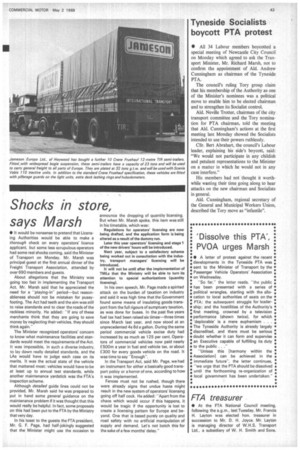Shocks in store, says Marsh
Page 45

If you've noticed an error in this article please click here to report it so we can fix it.
• It would be nonsense to pretend that Licensing Authorities would be able to make a thorough check on every operators' licence applicant, but some less scrupulous operators had some real shocks coming, said the Minister of Transport on Monday. Mr. Marsh was principal guest at the first annual dinner of the Freight Transport Association, attended by over 690 members and guests.
About allegations that the Ministry was going too fast in implementing the Transport Act. Mr. Marsh said that he appreciated the need for a "playing-in" period—but reasonableness should not be mistaken for pussyfooting. The Act had teeth and the aim was still to raise standards and to clear the roads of the reckless minority. He added: "If any of these merchants think that they are going to save money by neglecting their vehicles, they should think again."
The Minister recognized operators' concern to know what maintenance facilities and standards would meet the requirements of the Act. It was impossible, in such a diverse industry, to lay down really detailed standards, and the LAs would have to judge each case on its merits. It was the actual state of the vehicle that mattered most; vehicles would have to be at least up to annual test standards, while another maintenance yardstick was the FTA's inspection scheme.
Although detailed guide lines could not be provided, Mr. Marsh said he was prepared to put in hand some general guidance on the maintenance problem if it was thought that this would really be helpful. In fact, some proposals on this had been put to the FTA by the Ministry that very day.
In his toast to the guests the FTA president, Mr. G. F. Page, had half-jokingly suggested that the Minister might use the occasion to announce the dropping of quantity licensing. But when Mr. Marsh spoke. this itern was still in his timetable, which was:
Regulations for operators' licensing are now being drafted, and the application form is being altered as a result of the dummy run.
Later this year operators' licensing and stage 1 of the new drivers' hours wilt be introduced.
Next year. subject to a satisfactory scheme being worked out in consultation with the industry, transport managers' licensing will be introduced.
It will not be until after the implementation of TMLs that the Ministry will be able to turn its attention to special authorizations (quantity licensing).
In his own speech. Mr. Page made a spirited attack on the burden of taxation on industry and said it was high time that the Government found some means of insulating goods transport from the full rigours of sumptuary taxation, as was done for buses. In the past five years fuel tax had been raised six times—three times since March last year, and now stood at an unprecedented 4s fid a gallon. During the same period commercial vehicle excise duty had increased by as much as 125 per cent. Operators of commercial vehicles now paid nearly F500m a year in fuel and vehicle tax, or about E300 for every goods vehicle on the road. It was time to say "Enough".
In the Transport Act, said Mr. Page, we had an instrument for either a basically good transport policy or a horror of one, according to how it was implemented.
Fences must not be rushed, though there were already signs that undue haste might result in the new system of operators' licensing going off half cock. He added: "Apart from the chaos which would occur if this happens, it would be tragic if the opportunity is lost to Create a licensing pattern for Europe and beyond. One that is based purely on quality and road safety with no artificial manipulation of supply and demand. Let's not botch this for the sake of a few months' delay.




















































































































































































































